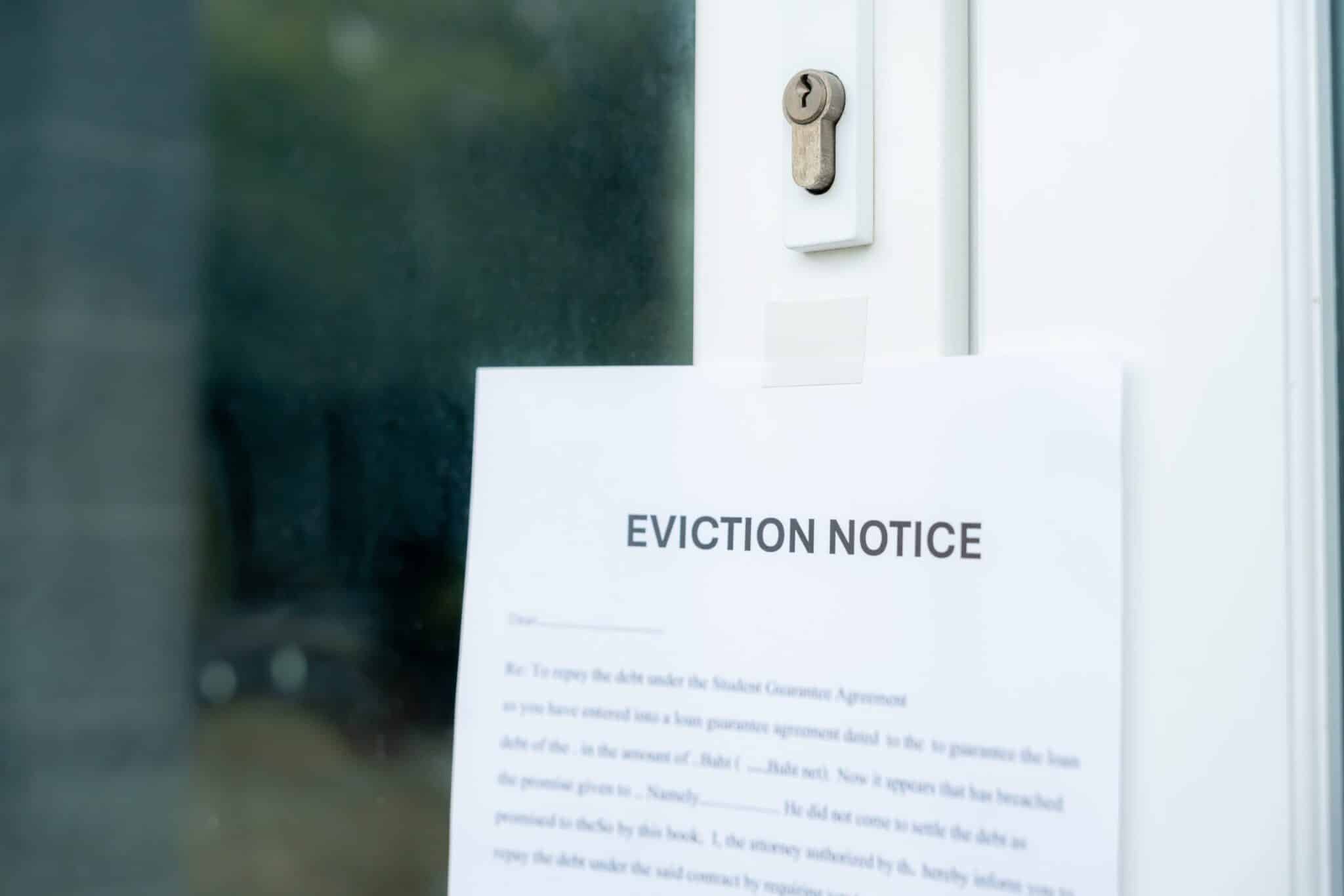Does an Eviction Notice Have to Be Served by a Sheriff? Expert Answers
Evelyn Sanderson - November 30, 2024

Eviction notices are stressful to receive, and dealing with a potential eviction can leave you scrambling. You may be wondering how eviction works in your state and whether or not a sheriff will be in charge of serving you with an eviction notice or ensuring you leave a property.
Our article tells you everything you need to know about evictions, including what to know about eviction notices and how to potentially prevent a looming eviction.
What Is an Eviction Notice?
An eviction notice is a notice that a landlord provides to tenants when they have not paid rent or engaged in another activity that warrants them being removed from the property. Because you cannot simply kick a tenant out of a rental property whenever you decide on it, the eviction notice serves as a warning to the tenants.
Tenants can choose to attempt to settle their issues with the landlord immediately to prevent eviction, but if this is not done, the tenant will be evicted from the property and in need of another place to live.
When Are Eviction Notices Given?
Eviction notices are given when a rental property’s tenant does not pay rent or when they have violated the terms of their lease. In most cases, evictions are due to unpaid rent, but if a tenant is engaging in illegal activities on the property or violating the lease in other ways, they can be evicted.
Typically, eviction notices have a time limit of when a tenant can potentially settle the issues and avoid eviction, but if this date rolls around and no steps have been taken to pay rent or remedy lease violations, the eviction will be processed, and the tenant removed from the property.
Does an Eviction Notice Have to Be Served by a Sheriff?
Eviction laws and regulations vary by state, and you may not need to be served an eviction notice by a sheriff. Many states allow a landlord to go through the correct court processes and obtain an eviction notice, posting it to the tenants of the apartment or home by themselves. The notice will generally give you a time limit for paying your overdue rent or leaving the rental property, and you will need to contact your landlord with any questions about how to settle the eviction.
If the time limit on paying your rent or making an arrangement with your landlord is up and you have not paid, a sheriff can show up to your rental property and remove you from the property.
You will need to consult with the laws in your exact state and county to review the laws on evictions applicable to your situation.
Can a Sheriff Evict Me From My Home?
A sheriff can evict you from your home if you have reached the end of the eviction notice (such as reaching the end of a 30-day period) and you have not paid your overdue rent or made any arrangements with your landlord.
In most jurisdictions, the sheriff will show up at your home or apartment on behalf of your landlord and make sure that you leave the property, taking your belongings. They will generally change the locks behind you and prevent you from reentering the property once you have been fully evicted.
How Can I Prevent an Eviction?
If you have been served a notice of eviction by your landlord, but you wish to remain in your property, you will need to pay any overdue rent in addition to resolving the other issues that the landlord has noted.
In many states, you will be able to stay in the home or apartment you are renting as long as you settle the issue that caused eviction with your landlord; you may be able to stay the remaining term of your lease, but many landlords will not provide you with a renewal option for your lease if you have had issues with potential eviction.
Can I Legally Resist Eviction?
In many states, you will have an opportunity to face your landlord in court after you have been served notice of an eviction. This is especially helpful when you have stopped paying rent due to a serious issue in the home, such as a health or safety hazard the landlord refuses to fix.
You can hold your rent money in escrow until the issue is fixed, and you will be ready to give it to the landlord once they ensure your property is livable. If the landlord serves you an eviction notice, you can face them in court to resolve this dispute.
That being said if you have been served an eviction notice and you are requested to leave a property, and then a sheriff shows up to remove you from the property, you cannot legally resist this. You will need to vacate the property with your belongings, and you will need to find another place to live. Consult state laws and eviction regulations in your county to understand more about your options during an eviction.
Will an Eviction Ruin My Rental Record?
Evictions on a rental record can be devasting, at least at first, but it is still possible to find housing even with an eviction on your record. In order to find a place to live after being evicted, you may need to show proof of stable employment, provide references, and pay multiple months’ rent ahead of time. This can help give your landlord faith that you will not default on rent and that they will not have to evict you.
Over time, and with a good reputation for renting, you can build up your rental record to be more positive, and you can collect positive references from landlords that work in your favor.
How Can I Recover My Credit From an Eviction?
Recovering your credit from an eviction can be difficult, as evictions will typically stay on your background check report and credit history for seven years. In order to deal with an eviction on your record, you will need to show a history of being responsible with loans or credit cards, making payments on time, and dedicating yourself to being a responsible tenant.
When you go to secure rental housing with an eviction on your record, you may need to provide a larger security deposit, pay the first and last month’s rent, and provide positive references to your potential landlord or property management company. In general, private landlords can be more lenient and easier to work with when you are trying to rent with an eviction on your record.
What Do I Do After Being Evicted?
If you are served a notice of eviction and end up being completely evicted from your residence, you will need to find another place to live. This can be challenging, as finding a rental home or apartment on short notice and while dealing with an eviction makes it hard to secure a place to live.
After being evicted, you can reach out to friends and family members who may be able to provide you with a space to stay while you figure out your next steps. You can consider putting the items from your home or apartment into storage, keeping only what you need to go to work and live day-to-day.
Local shelters may also be able to provide you with a bed to stay on while you figure out your next steps, and you may be able to access other programs and organizations that help you secure employment, medical treatment, and low-cost housing.
Dealing With Eviction the Right Way
Being served notice of an eviction can be stressful, especially if you are genuinely facing a life-altering issue, such as a medical condition or the loss of a job, that is affecting your ability to pay rent. If you are not able to come to an understanding with your landlord regarding any of these issues, you may find yourself needing to find an alternate place of residence.
Reach out to resources in your local community to ensure you have somewhere to live in case you are fully evicted from your home, and don’t hesitate to take advantage of services that help you get back on your feet. Also, consider running a reverse search on yourself in order to ascertain where you stand as far as any prior concerns in your past that might make finding new housing a chore.




![Daytime in Oakland, one of the most dangerous cities in California.]](https://information.com/latest/wp-content/uploads/2025/08/shutterstock_2484958985_medium.jpg)

